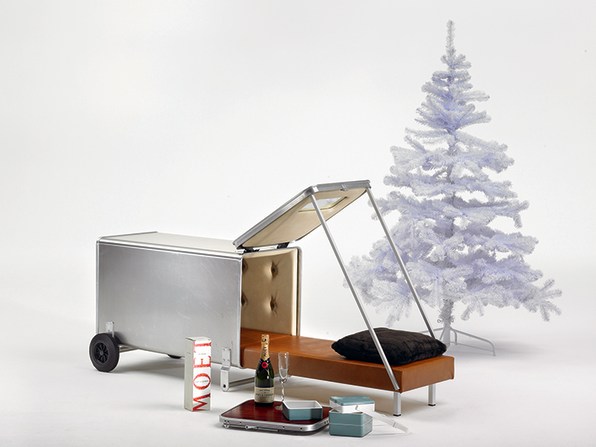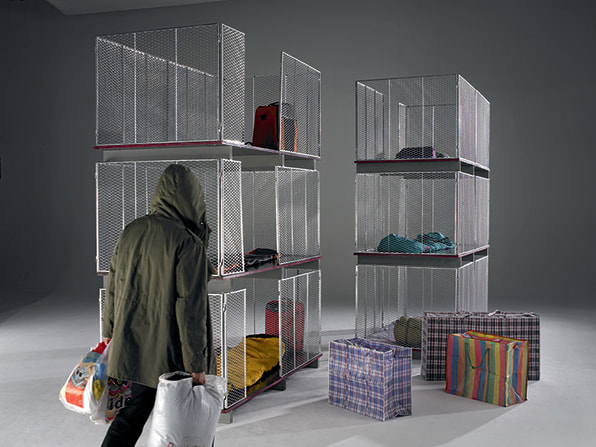How Long Can You Stay At A Homeless Shelter
Winfried Baumann's creations expect like some sort of art joke. Over the past 13 years, the German creative person has affixed solar panels and laptop trays to shopping carts, blimp padded mattresses in what appear to be hot dog carts, and created what can merely exist described as a suitcase for your torso. But these aren't whatsoever sort of parody: Congenital in response to a set of real needs for those living on the street, Baumann'due south "Instant Housing" pieces imagine a hereafter in which those who want to can comfortably live nomadic urban lifestyles, with as much as possible packed in as footling space equally necessary.
Later this year, Baumann will be publishing a collection of these efforts in a volume, accordingly called Urban Nomads. Recognizing that many people, homeless or nomadic or other, choose to stay out of formal shelter systems, Baumann began designing tiny, temporary housing systems that could be packed upward and carried around. He replaced cardboard and newspaper mats with aluminum and PVC, and so added outset aid kits, whistles, multi-tools, and flashlights within.

After testing the designs himself, Baumann asked homeless magazine sellers for communication.
"On one hand, there are and so many homeless people and urban nomads out there, who make use of the public and private facilities. On the other manus, there are plenty of really strong individualists, either homeless people or urban nomads, who would never make apply of those facilities," Baumann wrote in an email. "So therefore I think information technology is really important that the offers for help should be individual and different."
Later on creating several pieces for homeless individuals, Baumann realized that street dwellers often bumped up confronting the law, but didn't necessarily know what codes they were accused of violating. As a result, he'southward working with a legal advisor to develop a small "know your rights" booklet for the homeless to exist distributed later this year.

But Baumann'south piece of work doesn't just reflect the needs of the homeless. Micro-housing initiatives accept sprung up in cities all over the earth in response to rapid urbanization and housing demands of students and tech workers. Applied science the well-nigh functionality jam-packed (yet minimalist) being has get something of an international contest, perhaps fifty-fifty a new kind of status symbol for the design-conscious.
The irony of relatively flush urbanites seeking out these kinds of living situations isn't lost on Baumann.
"The future of the cities will be even more shaped by smaller and more flexible living spaces," he writes. "At the same time my objects display that the new and upcoming nomadism and the proceeds of independence is only possible if you are losing a lot of life quality."
Source: https://www.fastcompany.com/3027283/the-mobile-homeless-shelter-of-the-future
Posted by: estelljoyinewerhat.blogspot.com


0 Response to "How Long Can You Stay At A Homeless Shelter"
Post a Comment